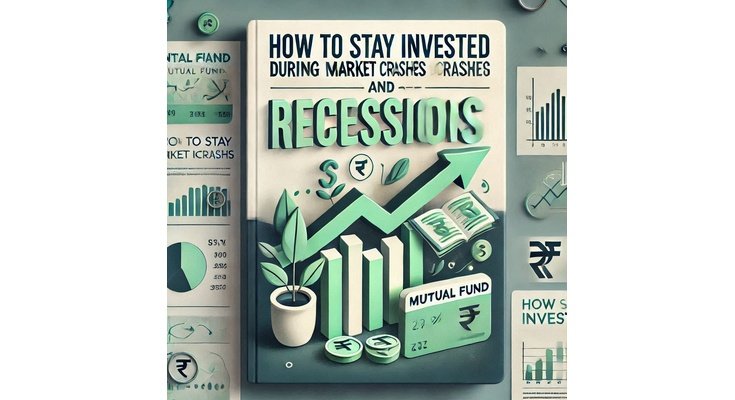
Investing in the stock market can be thrilling during bullish periods but intimidating when markets crash or a recession looms. Many investors panic, making impulsive decisions that can erode their wealth over time. However, staying invested during market downturns is critical for long-term wealth creation.
This article will provide practical strategies, Indian examples, and actionable advice to help you navigate challenging times in the financial markets. If you want more expert insights on financial planning and investing, visit RichPath.in—your trusted resource for wealth-building strategies.
Why Do Market Crashes and Recessions Happen?
Market crashes and recessions are often triggered by a combination of economic, geopolitical, and psychological factors.
Common Causes of Market Crashes
- Economic Slowdowns: GDP growth declines lead to reduced corporate earnings.
- Interest Rate Hikes: Higher borrowing costs reduce business profitability.
- Global Events: Wars, pandemics, or trade wars can disrupt global supply chains.
- Investor Sentiment: Panic selling amplifies the impact of negative news.
Indian Example: The 2020 COVID-19 pandemic led to a 40% drop in the Nifty 50 within weeks due to global economic uncertainties and lockdowns.
The Importance of Staying Invested
1. Markets Recover Over Time
Historically, markets have always bounced back from downturns. The BSE Sensex, which was around 100 in 1979, has grown to over 65,000 today despite multiple crashes.
2. Compounding Rewards Patience
Selling during a crash locks in losses and disrupts the compounding process. Staying invested allows your money to grow exponentially over the long term.
3. Time in the Market Beats Timing the Market
Predicting market tops and bottoms is nearly impossible. Remaining invested ensures you don’t miss out on significant recovery phases.
Strategies to Stay Invested During Market Crashes
1. Focus on Your Long-Term Goals
- Revisit your financial objectives to remind yourself why you started investing.
- Separate your short-term needs (for which you need liquidity) from your long-term goals like retirement or wealth creation.
Example: If you are saving for your child’s higher education 10 years away, a temporary market dip should not derail your plan.
2. Diversify Your Portfolio
- Invest across asset classes like equities, debt, gold, and real estate to reduce risk.
- Ensure geographical diversification by including international funds or stocks.
Example: A portfolio with 60% equities, 30% debt, and 10% gold can better withstand volatility than an all-equity portfolio.
3. Avoid Panic Selling
- Recognize that market crashes are part of economic cycles.
- Selling during a downturn turns paper losses into actual losses.
Example: Investors who sold their stocks during the 2008 financial crisis missed out on the massive rally that followed in 2009-2010.
4. Continue Your SIPs
- Systematic Investment Plans (SIPs) allow you to buy more units at lower prices during market dips, reducing the overall cost of investment.
- Stick to your SIP schedule irrespective of market conditions.
Example: A ₹10,000 SIP in an equity mutual fund started in 2010 would have grown significantly by 2023, despite interim market crashes.
5. Rebalance Your Portfolio
- Periodically adjust your portfolio to maintain your desired asset allocation.
- During a crash, consider moving funds from fixed income to equities to capitalize on lower valuations.
Example: If your original allocation was 70% equity and 30% debt, and equities fall to 60%, rebalancing will involve buying more equities to restore the 70% allocation.
6. Hold Cash for Opportunities
- Keep some cash or liquid funds to invest during market dips.
- Use this opportunity to buy quality stocks or funds at discounted prices.
Example: In March 2020, blue-chip stocks like HDFC Bank and Reliance Industries were available at attractive valuations.
7. Invest in Defensive Sectors
- Defensive sectors like FMCG, pharmaceuticals, and utilities are less affected during downturns.
- Consider reallocating some funds to these sectors for stability.
Example: During the 2020 pandemic, FMCG companies like Hindustan Unilever showed resilience compared to other sectors.
8. Adopt a Value Investing Approach
- Focus on fundamentally strong companies with low debt and consistent earnings.
- Avoid speculative or overvalued stocks.
Example: Warren Buffett’s strategy of buying undervalued stocks during market crashes has consistently yielded high returns.
9. Use Index Funds or ETFs
- Index funds track the performance of market indices, offering diversification at a low cost.
- They are less volatile than individual stocks.
Example: Investing in an Nifty 50 Index Fund during a market crash allows you to benefit from the eventual recovery of India’s top 50 companies.
Behavioral Tips to Stay Calm During a Crash
- Tune Out Noise: Avoid overreacting to sensational news or short-term market predictions.
- Practice Patience: Remind yourself that market recoveries take time.
- Consult a Financial Advisor: Get expert guidance to stay on track.
Indian Example: During the 2020 crash, many investors who panicked sold their equity holdings. Those who held on saw their portfolios recover and grow within a year.
Tools to Help You Stay Invested
1. Investment Trackers
- Use apps like Groww, Zerodha, or ET Money to monitor your portfolio.
2. Emergency Fund
- Maintain an emergency fund equivalent to 6-12 months of expenses to avoid selling investments during crises.
3. Automated SIPs
- Automate your SIPs to ensure disciplined investing regardless of market conditions.
The Role of Financial Education
Educating yourself about market cycles and investment strategies helps you stay confident during downturns. Reading trusted resources like RichPath.in can empower you with the knowledge to make informed decisions.
Conclusion
Market crashes and recessions are inevitable, but they also present opportunities for disciplined investors. By focusing on your long-term goals, diversifying your portfolio, continuing SIPs, and staying patient, you can weather the storm and emerge stronger.
For expert financial insights, visit Rich Path. and start your investment journey today! 🚀
Read more –
Top 5 Mutual Funds for Long-Term Growth in India in 2025
Best Mutual Funds: How to Choose – A Complete Guide
Best Flexi Cap Mutual Funds to Invest in 2025
Did this article help you? Like, share, and comment below to let us know your thoughts or suggest topics you’d like us to cover!



